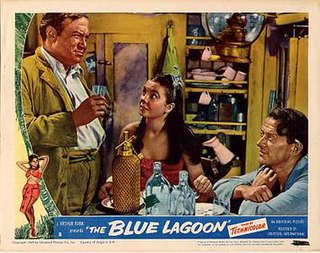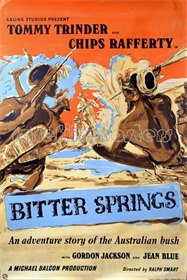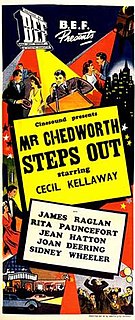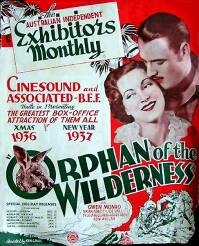Related Research Articles

The Blue Lagoon is a 1949 British coming-of-age romance and adventure film directed and co-produced by Frank Launder and starring Jean Simmons and Donald Houston. The screenplay was adapted by John Baines, Michael Hogan, and Frank Launder from the 1908 novel The Blue Lagoon by Henry De Vere Stacpoole. The original music score was composed by Clifton Parker and the cinematography was by Geoffrey Unsworth.

Cinesound Productions Pty Ltd was an Australian feature film production company, established in June 1931, Cinesound developed out of a group of companies centred on Greater Union Theatres, that covered all facets of the film process, from production, to distribution and exhibition.

Shirley Ann Richards was an Australian actress and author, who achieved notability in a series of 1930s Australian films for Ken G. Hall before moving to the United States, where she continued her career as a film actress, mainly as a Metro-Goldwyn-Mayer starlet. Her best known performances were in It Isn't Done (1937), Dad and Dave Come to Town (1938), An American Romance (1944), and Sorry, Wrong Number (1948). In the 1930s, she was the only Australian actor under a long-term contract to a film studio, Cinesound Productions. She subsequently became a lecturer and poet.

Palmy Days is a 1931 American Pre-Code musical comedy film written by Eddie Cantor, Morrie Ryskind, and David Freedman, directed by A. Edward Sutherland, and choreographed by Busby Berkeley. The film stars Eddie Cantor. The famed Goldwyn Girls make appearances during elaborate production numbers set in a gymnasium and a bakery. Betty Grable, Paulette Goddard, Virginia Grey, and Toby Wing are among the bevy of chorines. George Raft had an early role.

The Rats of Tobruk is a 1944 Australian film directed by Charles Chauvel. An abridged version was released in the United States in 1951 as The Fighting Rats of Tobruk. The film follows three drover friends who enlist in the Australian Army together during World War II. Their story is based on the siege of the Libyan city of Tobruk in North Africa by Rommel's Afrika Korps. The largely Australian defenders held the city for 250 days before being relieved by British forces.

Bitter Springs is a 1950 Australian–British film directed by Ralph Smart. An Australian pioneer family leases a piece of land from the government in the Australian outback in 1900 and hires two inexperienced British men as drovers. Problems with local Aboriginal people arise over the possession of a waterhole. Much of the film was shot on location in the Flinders Ranges in South Australia

Forty Thousand Horsemen is a 1940 Australian war film directed by Charles Chauvel. The film tells the story of the Australian Light Horse which operated in the desert at the Sinai and Palestine campaign during World War I. It follows the adventures of three rowdy heroes in fighting and romance. The film culminates at the Battle of Beersheba which is reputedly "the last successful cavalry charge in history". The film was clearly a propaganda weapon, to aid in recruitment and lift the pride of Australians at home during World War II. It was one of the most successful Australian movies of its day. It was later remade in 1987 as The Lighthorsemen.

Mr. Chedworth Steps Out is a 1939 Australian comedy film directed by Ken G. Hall starring Cecil Kellaway. Kellaway returned to Australia from Hollywood to make the film, which features an early screen appearance by Peter Finch.
Sons of Matthew is a 1949 Australian film directed and produced and co-written by Charles Chauvel. The film was shot in 1947 on location in Queensland, Australia, and the studio sequences in Sydney. Sons of Matthew took 18 months to complete, but it was a great success with Australian audiences when it finally opened in December 1949.
His Royal Highness is a 1932 Australian musical film directed by F. W. Thring, also known as His Loyal Highness, starring George Wallace in his feature film debut. It was the first Australian film musical.
The Silence of Dean Maitland is a 1934 Australian film directed by Ken G. Hall, and based on Maxwell Gray's 1886 novel of the same name. It was one of the most popular Australian films of the 1930s.

Thoroughbred is a 1936 Australian race-horse drama film directed by Ken G. Hall, partly based on the life and career of Phar Lap. Hollywood star Helen Twelvetrees was imported to Australia to appear in the film. The film also stars Frank Leighton and John Longden.

Orphan of the Wilderness is a 1936 Australian feature film from director Ken G. Hall about the adventures of a boxing kangaroo. It starred Brian Abbot who disappeared at sea not long after filming completed.

Lovers and Luggers is a 1937 Australian film directed by Ken G. Hall. It is an adventure melodrama about a pianist who goes to Thursday Island to retrieve a valuable pearl.
A Ticket in Tatts is a 1934 musical comedy film starring popular stage comedian George Wallace as an accident-prone stablehand. It was the last of three films Wallace made for F. W. Thring.
Alexander Roy Harwood (1897–1980), better known as A. R. Harwood, or Dick Harwood, was an Australian film director and producer who also worked in exhibition. He was inspired to become a filmmaker when he was posted to Tahiti to work for an insurance company and watched the shooting of Never the Twain Shall Meet (1925). He returned to Australia and produced and directed The Man Who Forgot (1927).
Clara Gibbings is a 1934 Australian film directed by F.W. Thring about the owner of a London pub who discovers she is the daughter of an earl. It was a vehicle for stage star Dorothy Brunton.
The Man They Could Not Hang is a 1934 Australian film directed by Raymond Longford about the life of John Babbacombe Lee, whose story had been filmed previously in 1912 and 1921.
The Mystery of the Hansom Cab is an Australian feature-length film directed by W. J. Lincoln based on the popular novel, which had also been adapted into a play. It was one of several films Lincoln made with the Tait family, who had produced The Story of the Kelly Gang.
Called Back is a 1911 Australian feature-length film directed by W. J. Lincoln based on a popular play which was adapted from an 1883 novel by Hugh Conway. Although the movie was a popular success it is now considered a lost film.
References
- ↑ Andrew Pike and Ross Cooper, Australian Film 1900–1977: A Guide to Feature Film Production, Melbourne: Oxford University Press, 1998, 165.
- ↑ "Screen and Curtain". The Argus . Melbourne: National Library of Australia. 29 August 1936. p. 36 Supplement: Week-End Magazine. Retrieved 6 April 2012.
- ↑ "The Voice of the Film Fan on Pictures and Players". The Argus . Melbourne: National Library of Australia. 12 September 1936. p. 40 Supplement: Week-End Magazine. Retrieved 6 April 2012.
- ↑ "Screen and Curtain". The Argus . Melbourne: National Library of Australia. 22 August 1936. p. 36 Supplement: Week-End Magazine. Retrieved 6 April 2012.